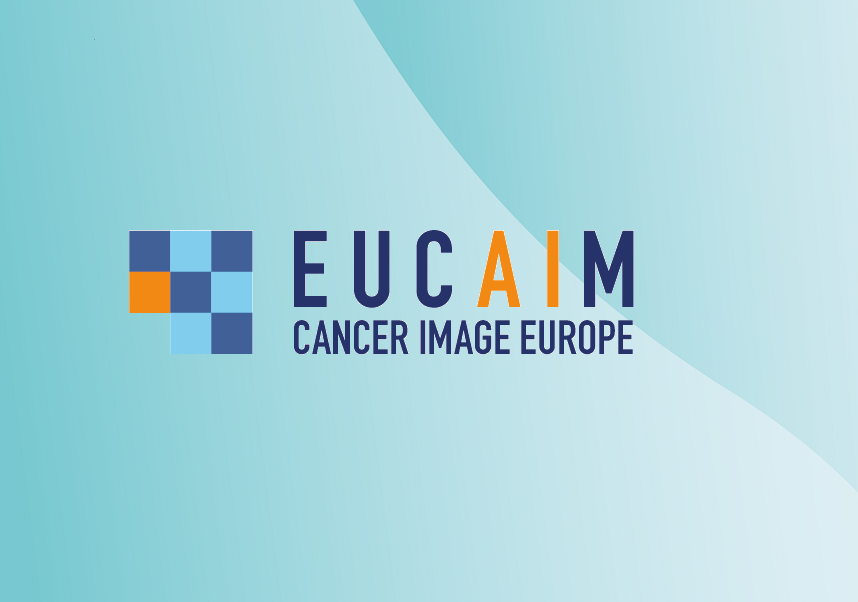
The scientific coordination of the EUCAIM project organized an event on October 6 at the Príncipe Felipe Research Center together with the main Spanish representatives of the initiative to display its latest advances at different levels. The talks, which included the presentation "Data governance model in the European Health Data Platform and Space (EHDS)" by the director of the Chair of Privacy and Digital Transformation at the University of Valencia (UV) and IRTIC member Ricard Martínez, highlighted the objectives of the action, the treatment of the data used, procedures and sustainability, among other elements.
EUCAIM will address the fragmentation of existing cancer image repositories and establish a distributed Atlas of Cancer Imaging with over 60 million anonymised cancer image data from over 100,000 patients, accessible to clinicians, researchers and innovators across the EU for the development and benchmarking of trustworthy Artificial Intelligence (AI) tools.
During his presentation, Martínez, also a professor of Constitutional Law at the UV, defined data spaces as an infrastructure based on common governance, organizational, regulatory and technical mechanisms that facilitate access to data and, with it, the development of business models based on its exploration and exploitation. In this sense, he differentiated the players in these spaces and the different related regulations, such as the Data Governance Regulation (DGA), the Open Data Directive and the Artificial Intelligence Regulation Proposal (AIA).
The promotion of clear rules and specific agreements on data sharing and terms and conditions was among the aspects on legal and ethical governance that the privacy expert explored, as well as the adoption of specific binding policies for users on data processing, traceability or non-identification clauses. Martinez also emphasized the definition of legal and ethical requirements, including new tools such as AI risk assessments, and the implementation of procedures supported by data access committees and collaboration with new stakeholders, such as health data access agencies.
The organizational governance issues he addressed highlighted the need for an adequate human resources infrastructure including data protection, security and data officers, compliance experts and data analysts, and addressed procedures such as transparency, logging, data accessioning and sharing, and data access permissions. The expert also stressed the importance of support and backup bodies.
Ricard Martínez co-directs the work package on ethics and data protection focusing his efforts on this second aspect. This matter, where anonymization is an important factor, is critical for the guarantee of fundamental rights in EUCAIM and the design of a secure and trustworthy ecosystem for researchers, healthcare institutions, patients and society. On the other hand, the UV will lead one of the first European experiences in "data altruism" aimed at studying how to promote data donation programs for research.
Likewise, professor Francisco Soriano, a member of the IRTIC of the UV, will provide and audit the security requirements to meet the privacy needs of the project, which will include elements related to confidentiality, integrity and traceability of information and use of this private information.
The infrastructure will be populated by observational studies from hospitals (21 clinical sites in 12 EU countries), include clinical images and link with pathology, molecular and laboratory data and will be expanded to at least 30 distributed data providers from 15 countries by the end of the 4-year project. Federated AI solutions will be trained at the hospital data warehouses, keeping data privacy.
The members of the consortium cover competences in cancer imaging and care, big data in medical imaging, FAIR (findable, accessible, interoperable and reusable) data management, ethical and legal aspects of medical data, development and deployment of research infrastructures, AI and machine learning, as well as dissemination, communication and stakeholder outreach in biomedical imaging.
The project is led by professor Luis Martí-Bonmatí, Director of the Medical Imaging Department, Chairman of Radiology, La Fe University and Polytechnic Hospital (Valencia, Spain) and coordinated by the European Institute for Biomedical Imaging Research (EIBIR), established by and headquartered at the European Society of Radiology in Vienna, Austria.
The EUCAIM initiative is a cornerstone of the European Commission-initiated European Cancer Imaging Initiative, a flagship of the Europe's Beating Cancer Plan, which aims to foster innovation and deployment of digital technologies in cancer treatment and care, to achieve more precise and faster clinical decision-making, diagnostics, treatments and predictive medicine for cancer patients.

EUCAIM is co-funded by the European Union under Grant Agreement umber 1011100633. Views and opinions expressed are however those of the author(s) only and do not necessarily reflect those of the European Union. Neither the European Union nor the granting authority can be held responsible for them.
EUCAIM is an Action supported by the Generalitat Valenciana through the Conselleria of Innovation, Industry, Trade and Tourism.











